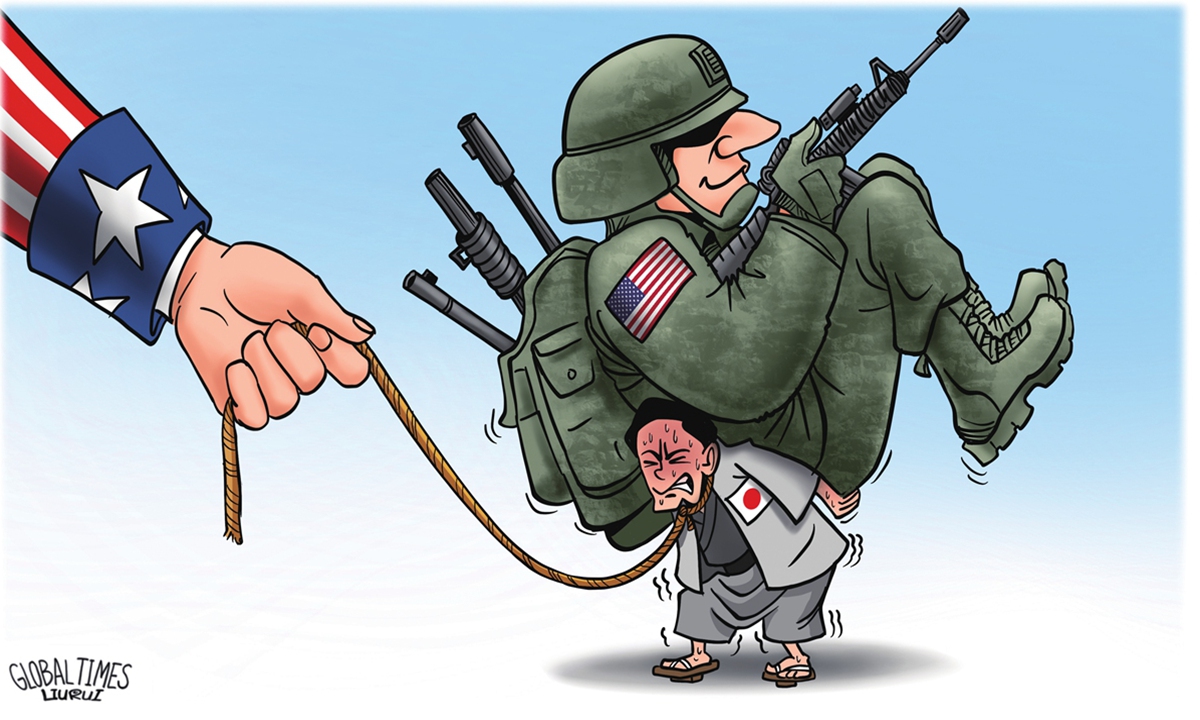
Illustration: Liu Rui/ GT
An Air Force CV-22 Osprey of US Forces Japan crashed last week in southwest Japan, resulting in the tragic death of all eight personnel on board. In response to the incident, Chinese Foreign Ministry Spokesperson Wang Wenbin on Tuesday stated that "while professing it protects the security of allies, the US has in fact become a source of insecurity for its allies."
Within the US-Japan alliance, the US has consistently asserted its role in safeguarding Japan. However, in the interactions between the US and Japan, situations frequently arise where the stationed US forces essentially undermine Japan's sovereign rights and interests, thereby substantively introducing insecure elements for Japan. According to statistics from the government of Okinawa Prefecture, by the end of 2020, US Forces Japan committed over 6,000 crimes and caused over 800 air accidents in Okinawa.
Reuters emphasized in its report that "the US has more than 50,000 US troops in Japan, many in the strategically important southwestern Okinawan islands, amid growing Chinese military assertiveness around nearby Taiwan." The primary objective of the extensive US military presence in this region is to counter the pressure posed by China's rapid development. Through strengthening cooperation with Japan, the US aims to enhance its military presence in East Asia, ensuring and elevating its influence and dominance throughout the Asia-Pacific region, Sun Xihui, an associate research fellow with the National Institute of International Strategy at the Chinese Academy of Social Sciences, told the Global Times.
The US has six Ospreys based at Yokota and 24 at the Futenma base on Okinawa. Japan asked the US to have a thorough investigation into the accident and before finding the reasons, stop flying Osprey aircraft deployed in Japan. But the US ignored this demand and continued flying the aircraft. This illustrates that in US policy toward Japan, the US prioritizes its own interests and intentions, irrespective of Japan's stance and opinions. The unequal and imbalanced status of the US and Japan within the alliance is evident.
According to the Status of Forces Agreement (SOFA) signed with Japan, the US military has exclusive rights to investigate accidents. During the investigation into a previous Osprey crash off Okinawa in 2016, Japan was also forced to be a bystander. SOFA largely defines the extraterritorial rights of US forces and their families in Japan, and is fundamentally unconstrained by the Japanese government. In light of this, it is implausible for the US to adhere to the Japanese government's directives to cease the use of a specific type of aircraft. For a sovereign nation like Japan, these privileged rights specified by SOFA evidently undermine Japan's national sovereignty and interests. Therefore, Japan, as a US "ally," perpetually assumes a subordinate position and fundamentally lacks the qualification to negotiate with the US, Song Zhongping, a Chinese military expert and TV commentator, told the Global Times.
The Japanese newspaper Mainichi urged Tokyo to insist on participating in the investigation into last week's crash and said Japan's continued sidelining after serious military accidents underscored the need for revisions to the bilateral agreement under which Japan hosts tens of thousands of US forces. Both local governments, such as Okinawa, and various media outlets, have expressed the desire to amend this agreement, but whether such an attitude can compel the Japanese government to change its position remains uncertain. Even if the Japanese government agrees to amend the agreement, it still requires US' consent. And in recent years, the US has been indifferent to such requests.
Given that the principle of US dominance and Japan subservient won't change, the objective of amending the agreement is unlikely to materialize. This incident is expected to primarily impact the dissatisfaction and sentiments of the Japanese public and media toward the US, rather than directly affecting the relationship between the Japanese government and the US, said Sun Xihui.
US' protection of allies is illusory, and safeguarding US' interests is the reality. The US always put itself first, and its national security is built upon the security of other countries. The US is willing to sacrifice the security of other nations to secure its own national security. The cornerstone of US national security lies in its global hegemony, and the US hopes that other allied countries will help maintain its global hegemony. When the global hegemony of the US conflicts with the interests of its allies, the US will abandon the interests of its allies, said Song.
The Osprey aircraft involved in this accident has experienced multiple severe accidents, leaving many injured, dead or missing. The US needs to take a serious and responsible attitude, take seriously the concerns of the local people, thoroughly investigate the accident, give a reasonable explanation to relevant parties, and restore peace and tranquility in the region, as Wang Wenbin mentioned.

